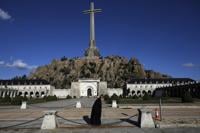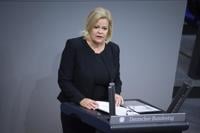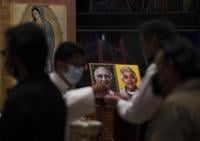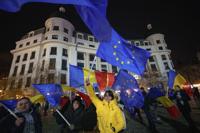MADRID (AP) ÔÇö The body of Jos├ę Antonio Primo de Rivera, the founder of Spain's fascist Falange movement, was exhumed from a Madrid mausoleum on Monday and transferred to a city cemetery.
The fascist political leader was executed by Spanish Republicans in November 1936, after Gen. Francisco Franco led an uprising of soldiers in July of that year to bring down Spain's democratically elected government. The ensuing civil war ended in 1939 with hundreds of thousands dead and the country left in ruins.
Primo de RiveraÔÇÖs death was exploited by Franco.
He was exhumed in line with that bans the glorification of Spain's dictatorship and fascist legacy. His body lay for six decades in a huge complex known as the Valley of the Fallen, which was built with forced prison labor to commemorate the fascist victory in the civil war.
The leader of the Falange was disinterred in a private ceremony in presence of his family, away from public scrutiny. His casket was taken by hearse to MadridÔÇÖs San Isidro cemetery, where a small group of supporters broke through a police cordon to perform fascist salutes and to sing the Falange anthem.
After Franco won the war, he ruled the country with an iron fist until his death in 1975. He was himself laid to rest in the Valley of the Fallen until 2019, when to a nearby cemetery by helicopter.
The Valley of the Fallen, recently rebaptized with its pre-war name, Cuelgamuros, is also the burial site of 34,000 people killed during the civil war. Many were initially buried in mass graves which were dug up at Franco's request. The bodies were moved to the Valley of the Fallen to fill the site with victims from both sides.
Last year, Spain approved a new law on historical memory that nullified legal decisions made during the dictatorship. It makes the central government responsible for the recovery of the still-missing bodies of tens of thousands of people forcibly disappeared by the regime.
Spain's Minister for the Treasury and Public Function, Mar├şa Jes├║s Montero, said on the eve of the exhumation that it was important to deliver ÔÇťjusticeÔÇŁ for the victims of fascism in Spain. ÔÇťItÔÇÖs very important that definitive steps are being taken to comply with a law that wants to give reparations and memory to the victims of the coup dÔÇÖ├ętat,ÔÇŁ she said.
A spokesman for the center-right Popular Party accused the government of using Primo de Rivera to ÔÇťdistractÔÇŁ Spaniards from their problems. Borja S├ęmper simply referred to the fascist movement's leader as ÔÇťa man who was murdered 80 years ago."
The government wants to turn the mausoleum site at Cuelgamuros into a place for reflection, and for the bodies taken there without consent to be returned to the families affected.
Jos├ę Antonio Primo de Rivera was the son of dictator Miguel Primo de Rivera, who ruled Spain from 1923-1930.








































